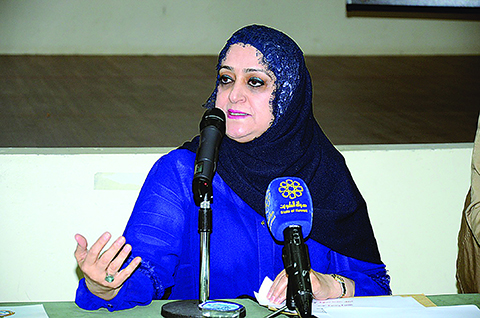 KUWAIT: The Women's Cultural and Social Society held a symposium on 'AIDS and Woman's Health' on Wednesday at its premises. It was presented by Dr Hind Al-Shomar, Head of the AIDS, Statistics, and Information Bureau and Repertoire of the National Committee for Eliminating AIDS. "The first case of AIDS in the world was discovered in 1981, while the first in Kuwait was in 1984," Dr Shomar said. "Eliminating AIDS and improving health is one of the millennium goals of the United Nations.
KUWAIT: The Women's Cultural and Social Society held a symposium on 'AIDS and Woman's Health' on Wednesday at its premises. It was presented by Dr Hind Al-Shomar, Head of the AIDS, Statistics, and Information Bureau and Repertoire of the National Committee for Eliminating AIDS. "The first case of AIDS in the world was discovered in 1981, while the first in Kuwait was in 1984," Dr Shomar said. "Eliminating AIDS and improving health is one of the millennium goals of the United Nations.
Kuwait is participating in the International Fund that aims to eliminate the AIDS cases to reach zero infected cases and zero deaths caused by AIDS. Speaking about this disease from the beginning was always related to sex, especially that first cases were from homosexuals. Most people are not aware of all the other causes for getting infected, so we have to raise awareness on that regard," she added.
Organ transplant
The first case of AIDS in Kuwait was caused by organ transplant. "This case was infected after an organ transplant operation carried out in a poor country, where they did not do tests for this virus. This is the reason why we advise patients not to do such surgeries in poor countries, as in these countries they do not do test for the organs," she added.
There are more activities that may cause AIDS. "Beauty salons are popular places for getting infected. We advise women not to do manicure and pedicure in cheap places, and the best would be to take their tools with them. Also, hair removal with laser can transfer this disease, as well as blades in men's salons. The acupuncture can also cause infection, and this happened in France, where a doctor infected 45 people with AIDS during this process. The toothbrush is another tool that may transfer the disease as it may contain micro drops of blood that we cannot see. Also, tattoo or piercing can cause infection," stressed Dr Shomar.
Pregnant mothers
An infected pregnant mother can infect her fetus during pregnancy or even during breastfeeding when it is natural. "For this reason, we advise the infected mothers to have cesarean delivery to avoid the baby getting in contact with the fluids as much as possible," she further said.
Shomar also spoke about the Kuwaiti legislation that are related to this issue. "The was law No 62/1992 on protecting others from infection, which also protects the AIDS patients and assures their rights of medical care, education, work, social care and other rights. Then law No 31/2008 about the compulsory medical tests before getting married, which is done for different diseases including AIDS.
And finally law No 46/2015 on providing medical test for all pregnant women, and if they were found infected they will receive treatment during the pregnancy to protect the fetus. The Kuwaiti legislation also set penalty for any patient who transfers AIDS deliberately to others. The wife has the right to get divorced if she found out that her husband is infected," she pointed out.
Myths
There are myths about some people getting infected through things that in fact do not transfer infection of AIDS. "Insects, sneezing, swimming pools, touching phone or other objects, using utilities, towels and sheets, kissing, hand shaking, and even wearing the underwear of a patient will not cause infection," she stated.
Prevention is very important. "If the pregnant woman received medical treatment she will protect her baby that will be born without infection. We have 38 babies born from such cases and they are not infected. If the nurse or doctor used a used needle on a patient's hand by mistake, he should immediately report the incident to get the preventive procedures," noted Dr Shomar.
Free tests
There is a project of doing tests anonymously by the Ministry of Health. "This service is provided for free, and if the person was found to be HIV positive, then he has to provide his name and other information in order to get the medical treatment, otherwise he can get private treatment outside, which costs about KD 600 per month. An AIDS patient has to continue in medical treatment till the end of his life, otherwise his condition will worsen.
With regular continues medication, the activity of the virus will stop and the patient's immunity will be strengthened. When the virus percentage in his blood reaches zero, then he will stop being infected, yet thus he would not be considered cured and has to continue to take his medication," she concluded.
By Nawara Fattahova, Staff Writer










